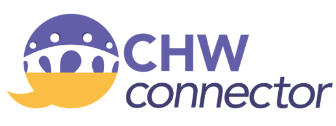The Six Pillars of Community Health Workers
Over many decades, CHWs, CHRs, Promotoras and other members of our community-based, frontline workforce have advocated and organized to articulate the CHW identity. Yet CHWs’ identities, origins and capacities are still not well understood in the U.S. – resulting in strategies, policies and programs that often do not respect, protect or authentically partner with us.
NACHW, in partnership with CHWs, CHW Networks and allies across the country have developed the Six Pillars of Community Health Workers – to communicate clearly and succinctly who we are, where we are, what we do, and our capacity and needs for sustainability.
See our webinar from February 9th, 2023, where we introduced the Six Pillars!
The Six Pillars
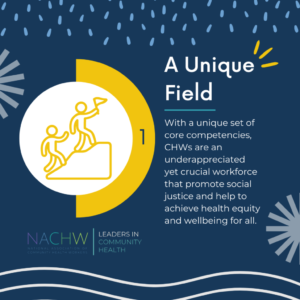 Community Health Workers (CHWs) are a one-of-a-kind group of public health workers. CHWs as a profession have a designated workforce classification by the US Department of Labor, and are recognized health professionals by the Affordable Care Act (ACA). When the COVID-19 pandemic began, the US Department of Homeland Security deemed CHWs essential and critical infrastructure workers. With a unique set of core competencies recognized by local, state, and federal governmental organizations, CHWs are an underappreciated yet crucial workforce that promote social justice and help to achieve health equity and wellbeing for all.
Community Health Workers (CHWs) are a one-of-a-kind group of public health workers. CHWs as a profession have a designated workforce classification by the US Department of Labor, and are recognized health professionals by the Affordable Care Act (ACA). When the COVID-19 pandemic began, the US Department of Homeland Security deemed CHWs essential and critical infrastructure workers. With a unique set of core competencies recognized by local, state, and federal governmental organizations, CHWs are an underappreciated yet crucial workforce that promote social justice and help to achieve health equity and wellbeing for all.
Longform copy: Community Health Workers (CHWs) are a one-of-a-kind group of public health workers. CHWs as a profession have a designated workforce classification by the US Department of Labor, and are recognized health professionals by the ACA. When the COVID-19 pandemic began, the US Department of Homeland Security deemed CHWs essential and critical infrastructure workers. With a unique set of core competencies recognized by local, state, and federal governmental organizations, CHWs are an underappreciated yet crucial workforce that promote social justice and help to achieve health equity and wellbeing for all.
Twitter copy: With a unique set of core competencies, CHWs are an underappreciated yet crucial workforce that promote social justice and help to achieve health equity and wellbeing for all.
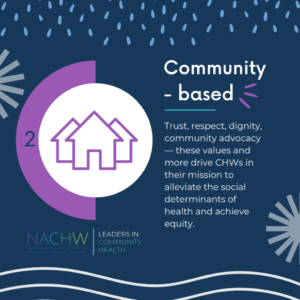 Grounded in and committed to community advocacy, CHWs build relationships with those around them and help build treatment capacity in underserved areas. Trust, respect, and dignity for all human beings are core values among CHWs, and these public health workers are central to efforts to address clinical and community integration and the social determinants of health. CHW Networks and Associations help train and mobilize CHWs and provide support for local communities, from low-income city neighborhoods to remote rural villages, tribal nations, and territories.
Grounded in and committed to community advocacy, CHWs build relationships with those around them and help build treatment capacity in underserved areas. Trust, respect, and dignity for all human beings are core values among CHWs, and these public health workers are central to efforts to address clinical and community integration and the social determinants of health. CHW Networks and Associations help train and mobilize CHWs and provide support for local communities, from low-income city neighborhoods to remote rural villages, tribal nations, and territories.
Longform copy: The heart of CHW work is grounded in and committed to community advocacy, capacity building and relationship. Trust, respect, and dignity for all human beings is at the center of who they are and what they do. CHWs’ compassion and commitment to families and communities where they live and serve is largely due to shared life experience. CHWs are leaders within and of community-based organizations and nonprofits, and are central to all efforts that seek to address clinical and community integration and the social determinants of health.
Twitter copy: Trust, respect, dignity, community advocacy — these values and more drive CHWs in their mission to alleviate the social determinants of health and achieve equity.
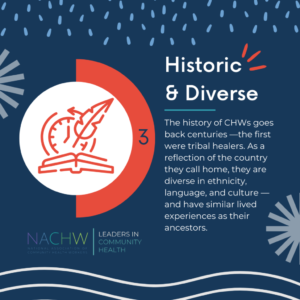 The history of CHWs goes back hundreds of years in the US. They’ve been here since the very beginning, in the form of tribal healers, and today are known by many different titles — community health representatives, promotoras, aunties, peers, outreach workers, and many others. As a reflection of the country they call home, they are diverse in ethnicity, language, and culture — the majority of CHWs are female people of color. These health workers have lived experience and cultural alignment, and deal with similar issues and suffer from many of the same chronic conditions as their ancestors, which makes them uniquely qualified to tackle community-based health problems.
The history of CHWs goes back hundreds of years in the US. They’ve been here since the very beginning, in the form of tribal healers, and today are known by many different titles — community health representatives, promotoras, aunties, peers, outreach workers, and many others. As a reflection of the country they call home, they are diverse in ethnicity, language, and culture — the majority of CHWs are female people of color. These health workers have lived experience and cultural alignment, and deal with similar issues and suffer from many of the same chronic conditions as their ancestors, which makes them uniquely qualified to tackle community-based health problems.
Longform copy: The origins of the CHW workforce in the United States goes back hundreds of years. Their strength is their diversity across language, culture, faith, race, and gender, and their history as healers and advocates, community health representatives, promotores, aunties, outreach workers, peers and dozens of other work titles. As a reflection of the country they call home, they are diverse in ethnicity, language, and culture — the majority of CHWs are female people of color.
Twitter copy: The history of CHWs goes back centuries —the first were tribal healers. As a reflection of the country they call home, they are diverse in ethnicity, language, and culture — and have similar lived experiences as their ancestors.
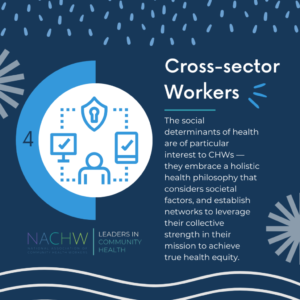 CHWs reduce barriers to healthcare and build capacity in underserved communities, helping their communities achieve optimal health and wellbeing. The social determinants of health are of particular interest to CHWs — they approach health with a holistic philosophy, considering socioeconomic and cultural factors in their attempt to achieve true health equity. CHWs establish formal and informal networks in local contexts and beyond to better leverage their collective strength and to serve their communities to the best of their abilities.
CHWs reduce barriers to healthcare and build capacity in underserved communities, helping their communities achieve optimal health and wellbeing. The social determinants of health are of particular interest to CHWs — they approach health with a holistic philosophy, considering socioeconomic and cultural factors in their attempt to achieve true health equity. CHWs establish formal and informal networks in local contexts and beyond to better leverage their collective strength and to serve their communities to the best of their abilities.
Longform copy: CHWs work to reduce barriers and build capacity for people to achieve whole health and wellbeing, which requires consideration of the social determinants of health, and they play a critical role in addressing these social determinants. CHWs work with other CHWs who are working within different sectors to integrate the needs of individuals. They work in food security and social work, cancer, HIV and substance abuse treatment, and many other specialties. They participate in advocacy and support groups, as well as education, mental health, housing, workforce development, immigration and voting rights organizations.
Twitter copy: The social determinants of health are of particular interest to CHWs — they embrace a holistic health philosophy that considers societal factors, and establish networks to leverage their collective strength in their mission to achieve
true health equity.
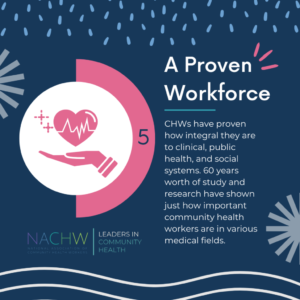 In terms of effectiveness, CHWs have proven how integral they are to clinical, public health, and social systems. 60 years worth of evidence of their effectiveness has been acquired through the study of CHWs in maternal and child health, chronic disease interventions, immunization, oral health, HIV, primary care, and many other disciplines. The results are clear: CHWs play a crucial role in societal healthcare efforts, as documented in countless randomized control trials, systematic reviews, and ROI studies of CHW interventions. In recent years, CHWs have increasingly been recognized for their contributions to addressing racial equity and the social determinants of health – by connecting individuals to basic needs and by organizing communities to address inequitable social conditions.
In terms of effectiveness, CHWs have proven how integral they are to clinical, public health, and social systems. 60 years worth of evidence of their effectiveness has been acquired through the study of CHWs in maternal and child health, chronic disease interventions, immunization, oral health, HIV, primary care, and many other disciplines. The results are clear: CHWs play a crucial role in societal healthcare efforts, as documented in countless randomized control trials, systematic reviews, and ROI studies of CHW interventions. In recent years, CHWs have increasingly been recognized for their contributions to addressing racial equity and the social determinants of health – by connecting individuals to basic needs and by organizing communities to address inequitable social conditions.
Longform copy: Over 60 years of evidence exists of the effectiveness of CHWs, as confirmed in a number of randomized control trials, systematic reviews, and ROI studies of CHW interventions. They have proven themselves in a variety of fields, including maternal and child health, behavioral health and recovery, chronic disease and community violence interventions, immunization, oral health, and other areas. CHWs are also increasingly recognized for our contributions to addressing racial equity and the social determinants of health — by connecting individuals to basic needs and by organizing communities to address inequitable social conditions.
Twitter copy: CHWs have proven how integral they are to clinical, public health, and social systems. 60 years worth of study and research have shown just how important community health workers are in various medical fields.
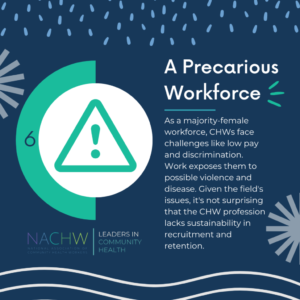 As a majority-female workforce, CHWs face similar challenges to other female-dominated fields. They are among the lowest paid public health professionals, and frontline community work exposes them to communicable diseases, violence, and other forms of secondary trauma. Exacerbating these issues are an inconsistent professional identity and lackluster state and national-level legislation. Given the field’s issues, it’s not surprising that the CHW profession lacks sustainability in many areas such as recruitment, training, legislation, professional development, career ladders, and financing.
As a majority-female workforce, CHWs face similar challenges to other female-dominated fields. They are among the lowest paid public health professionals, and frontline community work exposes them to communicable diseases, violence, and other forms of secondary trauma. Exacerbating these issues are an inconsistent professional identity and lackluster state and national-level legislation. Given the field’s issues, it’s not surprising that the CHW profession lacks sustainability in many areas such as recruitment, training, legislation, professional development, career ladders, and financing.
Longform copy: CHWs are a majority female workforce. And given their racial, ethnic, and gender identities, they are among the lowest paid among other public health professionals. CHW-led organizations remain dependent upon short term grants instead of sustainable reimbursement models. National and state policies, health systems and providers are inconsistent in their recognition and integration of CHWs’ professional roles, and they lack national and state level data to track and describe trends in career pathways, training, diversity, and impact across interventions and organizations.
Twitter copy: As a majority-female workforce, CHWs face challenges like low pay and discrimination. Work exposes them to possible violence and disease. Given the field’s issues, it’s not surprising that the CHW profession lacks sustainability in recruitment and retention.
Spread the word!
CHWs and allies alike are encouraged to spread the word about the Six Pillars of CHWs! Help us achieve our mission of defining the CHW profession and fostering a sense of professional identity using the infographic and toolkit below! In addition, feel free to link to this page using this shortened URL: https://buff.ly/3x94cn1
Click here to access the slideshow presentation for the pillars that you can share with your audiences!

